As the UN appeals for $1bn, experts and people working on the ground – from the London School of Hygiene and Tropical Medicine, the International Medical Corps, the Overseas Development Institute, the School of Oriental and African Studies, the World Health Organisation and the Centers for Disease Control and Prevention – tell us seven things that can be done to tackle Ebola, which has already killed more than 2,250 people.
1 Community outreach to build trust
Fear and misunderstanding have not helped the response. Outreach with traditional and community leaders helps alert people to the risks of Ebola and how to prevent its spread. Rural communities tend to have good local organisation as village chiefs know and coordinate the local residents. Once the disease has reached urban areas, solidarity can be harder to achieve. Overcoming denial and resistance by providing information and facilities is key to reducing preventable deaths in the longer term.
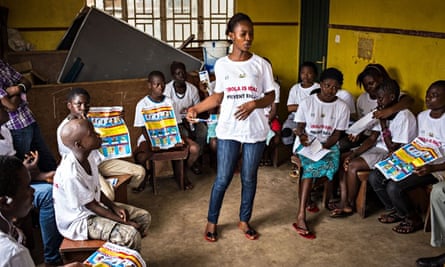
Frontline medical staff must engage personally with influential people within communities. Information spread by radio and banners is not enough. In the longer term, relationships will need to be rebuilt between citizens and governments in countries affected by Ebola. Sierra Leone and Liberia are both post-conflict countries where trust was tentatively being built.
According to Sean Casey of the International Medical Corps who has been in Guinea, Sierra Leone and is now in Liberia: “Ebola is the only thing anyone is talking about here. People are well aware of the dangers though there are still some misconceptions. For example, although there are chlorinated handwashing facilities everywhere, some people are still using soap which counters the effect.”
2 Contact tracing
Public health workers need further support and training in tracing those who have been exposed to the virus. Anyone at risk must have their temperature taken twice a day and, if a fever develops, they need to go to a treatment facility. Funding is required to do this, and to hire and train more volunteer tracers.
3 Coordination and response
Analysis and sharing information about what is going on and where the gaps are is critical, for example patients need safe transport to hospitals. Typically people who suspect they are developing the disease are collected by an ambulance team consisting of a nurse, a driver and two sprayers, using a pick-up truck with a mattress for the patient. Once likely exposure and symptoms are established by the nurse, homes are disinfected by the first sprayer, as is the path taken to the vehicle. The second person needs to spray down the first as they follow the complex drill for removing the protective suits and handwashing. After each contact, the protective equipment used must be incinerated. The US Centers for Disease Control and Prevention is supporting the collection and sharing of data.

4 More and better-equipped treatment centres
In the three hardest-hit countries – Guinea, Liberia and Sierra Leone – the World Health Organisation says the number of new cases is outpacing capacity in specific Ebola treatment centres. Basic supplies are urgently needed, delivered in good condition and with advice and instructions on how they should be used. In too many cases frontline medical staff are operating with a lack of basic equipment needed to protect them. Until a reliable supply chain can be set up for this equipment, specialist centres cannot be operated.
The International Medical Corps this week opened its first treatment unit in Bong Country, Liberia, with 200 staff bolstering Médecins sans Frontières’ frontline operations, the sixth centre in the country – the WHO says it needs 17. Each unit costs $1m a month to operate, indicating the scale of funding required. The Bong County unit is a new facility constructed by Save the Children in an isolated location 2km down a dirt track with funding from USAid.
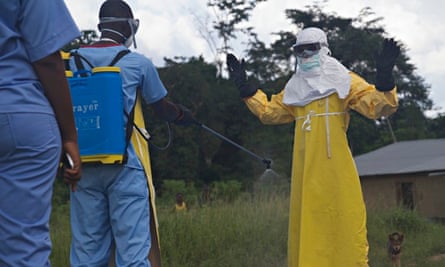
By providing Ebola-specific centres, the Liberian health ministry hopes to be able to provide other essential care, such as maternity services, in those health centres and hospitals it can staff. President Ellen Johnson Sirleaf said: “The announcement yesterday by the US of direct military assistance is a significant moment in the battle against Ebola. We hope this decision will spur the rest of the international community into action. Our American partners realise Liberia cannot defeat Ebola alone. This disease is not simply a Liberian or west African problem. The entire community of nations has a stake in ending this crisis.”

Ultimately, central governments in countries affected by Ebola will need long-term investment to deliver adequate health services beyond the immediate humanitarian response.
5 Well-trained and supported professionals
The international community must provide frontline staff and training, as well as money. In one hospital in Kenema, Sierra Leone, 39 healthcare workers have died. The skills of doctors and nurses who can comfort patients despite the barriers of wearing protective suits and working in demanding conditions are critical. To ensure local healthworkers receive their pay and can provide care safely, financial support – including a hazard incentive, insurance and appropriate clothing – is essential.
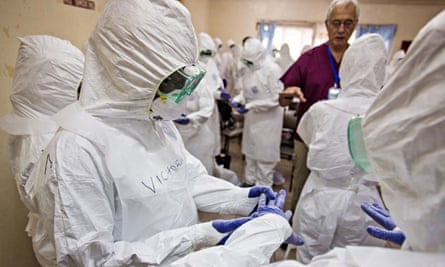
6 Research and development
Despite the enormous impact of the disease in sub-Saharan Africa, the global medical and research agenda is typically driven by the private sector, which rarely prioritises diseases that primarily affect poor people. Categorising outbreaks of diseases like Ebola as a bio-threat opens up government and public health funding.
US president Barack Obama has called the Ebola epidemic a potential threat to global security. The US has funded two companies developing drug treatments and is working with another to develop a vaccine. It is also supporting further development and manufacture of a small amount of the experimental drug ZMapp for early stage safety studies. The National Institutes of Health medical research agency and Oxford University have begun a vaccine trial. The first healthy UK volunteer, who works for the NHS, received the vaccine on Wednesday in a safety trial at Oxford.
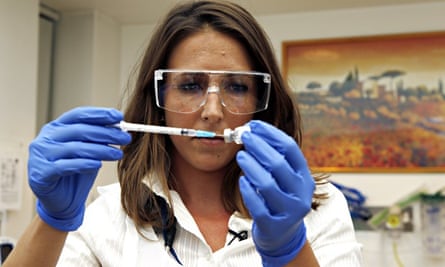
7 Innovation and intelligence
During the 1995 outbreak in the Democratic Republic of the Congo, eight patients, of whom seven survived, received experimental cold-blood fusions, or plasmapheresis, in which serum is taken from patients who have survived the disease and have good levels of antibodies in their blood and given to those affected. Survivors need good nourishment between donations. For this to work alongside interventions like ZMapp, clinical trials need to be set up as soon as possible, giving exposed patients an incentive to go to hospital and receive treatment.
Better intelligence needs to be gathered on how people access care, rather than focusing on how health services are provided. People rely on an array of providers – from traditional and religious healers, to government-run clinics and hospitals, to community health volunteers. Understanding how people navigate these choices when they are ill, and why, is critical to building understanding for dealing with future health emergencies.
Sources: London School of Hygiene and Tropical Medicine, IMC, ODI, Soas, WHO, CDC
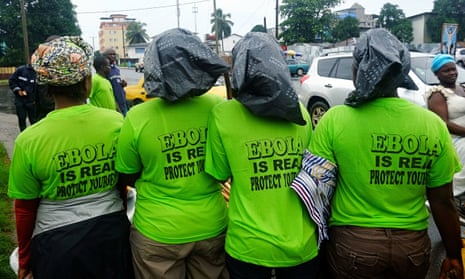
Comments (…)
Sign in or create your Guardian account to join the discussion